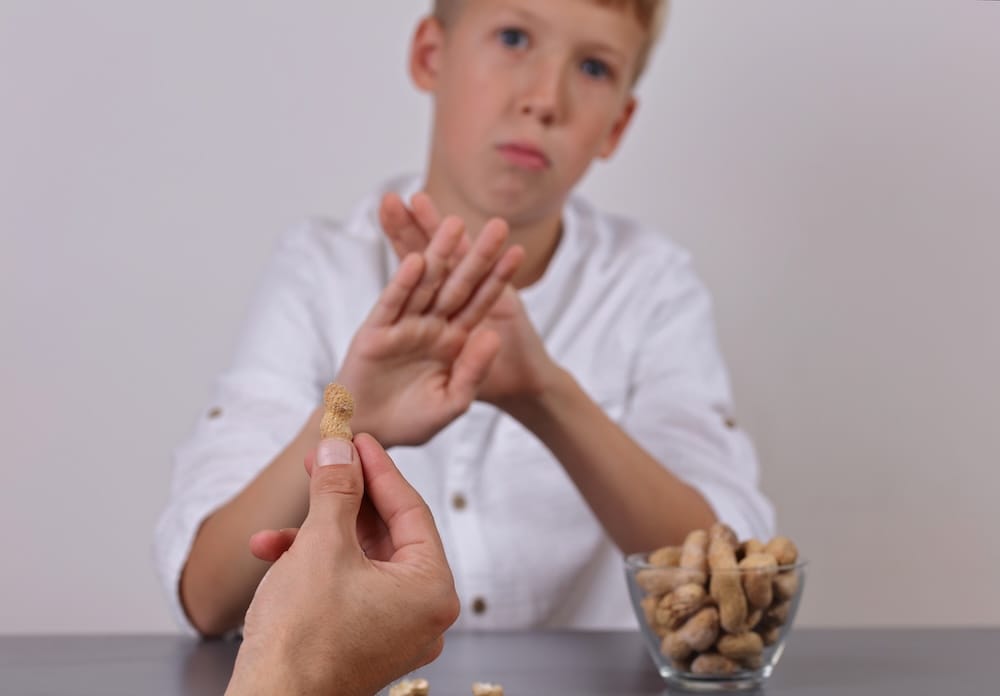
Did you know that in North Texas and throughout the United States, nearly 8% of children live with a food allergy diagnosis? Of those, about 2% have peanut allergies, according to Food Allergy Research & Education (FARE). As one of the Top 9 Major Allergens identified by the U.S. Food & Drug Administration (FDA), symptoms can range from mild discomfort to severe, life-threatening events like anaphylaxis. This is why it’s important to know what the early signs and symptoms of peanut allergies in children actually look like, and where to get help.
What Are the Symptoms of Pediatric Peanut Allergy?
It is well established that food allergies are on the rise, not just in North Texas families, but also worldwide. Certain foods, especially shellfish, milk, eggs, sesame seeds, tree nuts, fish, wheat, soy and peanuts (the Top 9) cause abnormal bodily reactions because the immune system perceives certain proteins in these foods to be a threat. When a parent has a food allergy (or it seems to run in the family), children are more likely to also have food allergies.
While today there are many cutting-edge, non-invasive treatment options available for peanut allergy, knowing how to identify the signs and symptoms is the first step in addressing this issue. As a parent or caregiver, you know well that young children may not have the vocabulary to express their discomforts, and how concerning that is. As a child’s immune system is developing, peanut allergy symptoms may also present differently in different children.
Allergy Symptoms More Likely in Infants and Toddlers
Infants and toddlers speak with their actions. Sometimes allergic reactions are harder to identify in babies because parents can confuse them with other illnesses. Below are bodily changes and behaviors to look for after a child ingests peanut protein or any other allergen.
- Itching, evidenced by ear or tongue pulling and scratching.
- Rashes or hives.
- Hoarse voice or broken crying.
- Diarrhea or vomiting, or other sudden gastrointestinal distress.
- Sudden behavioral changes such as crankiness, excessive clinginess, lethargy.
Allergy Symptoms Common in Older Children
In addition to the symptoms listed above, older children are more likely to exhibit the following symptoms as a result of peanut allergies.
- An itchy throat or other oral irritations.
- Trouble breathing, which can be shortness of breath or restricted air flow (this can also happen in infants and toddlers but is more common in older children).
- Difficulty with swallowing.
- Flushed appearance.
- Swelling of the mouth, tongue, face or neck.
If your child exhibits any of these symptoms within a couple of hours after eating peanuts or a product with peanuts in it, you should seek professional care. In the event of a severe reaction such as anaphylaxis, use an epinephrine auto-injector if you have one, and get emergency care immediately.
For milder reactions, set up food allergy testing with a board certified allergist as soon as you can. In the meantime, avoid foods and beverages with peanuts and start reading food labels to see if peanuts are an ingredient—this includes the potential trace amounts which should also be listed on a label.
Visit a Top North Texas Food Allergist for Peanut Allergies
We know keeping your children healthy, educated and prepared for any situation with their peanut allergy is a top priority for you. TexasAllergyMD provides allergy testing and customized treatment plans for children and adults at our allergy treatment centers in McKinney/Prosper and Southlake. To get started, call us today at (469) 375-1525 or request an appointment











